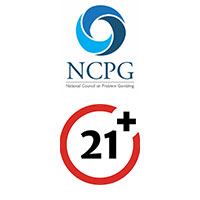Do you not have a debit or credit card? Or perhaps you want to gamble online, but not broadcast it to your bank, spouse or parents.
Then a Visa prepaid or gift card is the way to go.
A prepaid card gives you another way to use Visa, the fastest and most convenient method for funding your online casino account.
What Are The Benefits to Prepaid Cards & Online Casinos?
There are several reasons why you might consider using a prepaid card. Even if you have a debit or credit card.
#1 – A prepaid card can fund other deposit methods. For example, you can use a prepaid card to fund money transfers. This is in a worst-case-scenario, of course, where your prepaid card is declined (or just not accepted). But it’s good to know that it won’t ever go to waste.
#2 – Prepaid cards won’t leave footprints. In other words, if you use your bank card to buy a prepaid card, all your bank will know (and care less about) is that you loaded up a card with ‘x’ amount of dollars. They won’t know how you spend it. And if you go one step further and buy a prepaid card with cash, they’re completely in the dark.
#3 – Prepaid cards are a good way to budget your gambling funds. You can allot so much money every month to play blackjack with, then upload that amount to your card each month. When you run out, you’re done. And it’s a large enough inconvenience to run back to the store to load the card again, making it less likely that you’ll splurge.
Are There Any Downsides to Prepaid Visa Cards?
There are a couple of limitations, sure.
#1 – You’re limited to how much you can load onto one card. Each card is different. One might be $100, while another might be $500 or $1,000. So you want to make sure you get one that fits your bankroll, but at the same time doesn’t exceed the casinos daily limit (unless you don’t mind leftovers).
#2 – There are fees. You will pay a fee to buy/load your card, and some cards will have monthly “maintenance” fees, too.
#3 – You’re out of luck if your card is ever lost or stolen. These aren’t like your bank card, where you can close them or have buyer protection. If you lose your card, you just bought someone else a nice steak dinner or pair of shoes.
#4 – Prepaid cards cannot be used for withdrawals, either.
At the end of the day, the benefits far outweigh the negatives. I mean, really, what’s a few bucks in fees or the inconvenience of finding a withdrawal method (which is standard for Americans anyway) compared to having another piece of plastic as a backup deposit method – that has the added bonus of privacy?
Totally worth it, in my opinion.
Where Do You Get Prepaid Cards?
Here in the US you can buy them from your local drug or department stores. This includes:
- Fred Myers
- Wal-Mart
- Costco
- K-Mart
- Walgreens
- Safeway
- 7-11
- Rite-Aid
You can also buy prepaid and/or gift cards online, too.
One example is the Visa Vanilla, a gift card with the catch phrase, One Card, A Million Options. The premise is that you use it to buy anything, or to shop anywhere – you have millions of options (yes, even gambling).
The Visa Vanilla comes in $25, $50 and $100 increments. You can find locations for where to buy them, or check your balance, using their website.
Visa History & Company Details
Visa is a well-known company. You’d have to be living in Antarctica or on Mars, not to know who they are. Their commercials play regularly on TV (during the Olympics or sports games, for example). And you can see their logos on brick and mortar stores, on cash registers and at any store online.
But, in case you are from Mars, here’s a little bit about their company.
They got their start back in 1958. Back then they were known as BankAmericard. They later changed their name to Visa in 1976.
Visa was one of the first companies to successfully introduce a revolving charge card where the balance didn’t need to be paid in full each billing cycle. (This was clearly a ‘win’ for the banks and not so much for the consumer, evident by the $15,000 average debt held by families in 2013.) It took until 1970 for the idea to pan out though, thanks in part to all the delinquencies.
They (obviously) went on to become a successful company, processing billions of dollars in transactions each year. They went public in 2008, selling 406 million shares at $44/share. They managed to raise $17.9 billion dollars, the largest IPO in US history.
Nowadays they operate out of Foster City, California, issuing debit, credit and prepaid cards to financial service companies all over the world.
